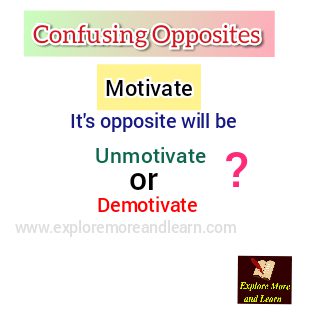Opposites can also be confusing
In (prefix) + visible (word) = invisible
In + secure = insecure
Mis + lead = mislead
-
1.an arrangement to meet someone at a particular time and place.“she made an appointment with my receptionist”
-
2.an act of assigning a job or position to someone.“his appointment as President”
Whereas disappointment means:
-
sadness or displeasure caused by the non-fulfilment of one’s hopes or expectations.
-
a person or thing that causes disappointment.“the job proved a disappointment”
-
-
Motivate: What is the opposite of motivate?
Unmotivate” is not actually a real word, but it is often confused with “demotivate”. The difference between “unmotivated” and “demotivate” is that the first describes a state of being while the second describes a process of losing motivation.
Demotivate :- to make someone feel less interested and enthusiastic about his work:
Motivate (v)
Opposite demotivate (v)
Unmotivated (adj) motivated (adj)
-
Disinterested and Uninterested
Many native speakers use these two words with the same meaning – bored, or not interested. That’s certainly the meaning ofuninterested, but it’s not the meaning of disinterested. The real meaning ofdisinterested is impartial, objective or not taking a side in an argument.
A judge hearing a court case should be disinterested, but definitely not uninterested.
-
Disorganised and unorganised
Disorganised and unorganised are often used interchangeably to mean not arranged in an orderly way.
His desk is disorganised.
His desk is unorganised.
But they have subtly different meanings.
Disorganised has a sense of confusion or disorder. Unorganised is more neutral.
His desk is unorganised, but he knows where everything is.
His desk is disorganised and he can’t find a thing.
Her desk is a mess, but she knows where everything is.
Her desk is not well organised, but she knows where everything is.
The Oxford Dictionary defines organize as “give an orderly structure .” Therefore, unorganized means the opposite — not organized or not orderly.
Disorganized has a stronger connotation. It means to “destroy the system or order; throw into confusion.” It indicates a chaotic mode.
Here it is very important to know the difference between prefixes ‘dis’ and ‘un’.
Dis- as a prefix often implies the reversing of the action of the verb (e.g. disagree, disown, distrust).
Un- as a prefix means ‘not’ (e.g. unable, unusual, untidy).
So always remember this difference before thinking about opposites for any word. I hope thispost is helpful for many.
To understand this post in a better way, you can watch the video below.
Some other important posts:
Difference between its and it’s
